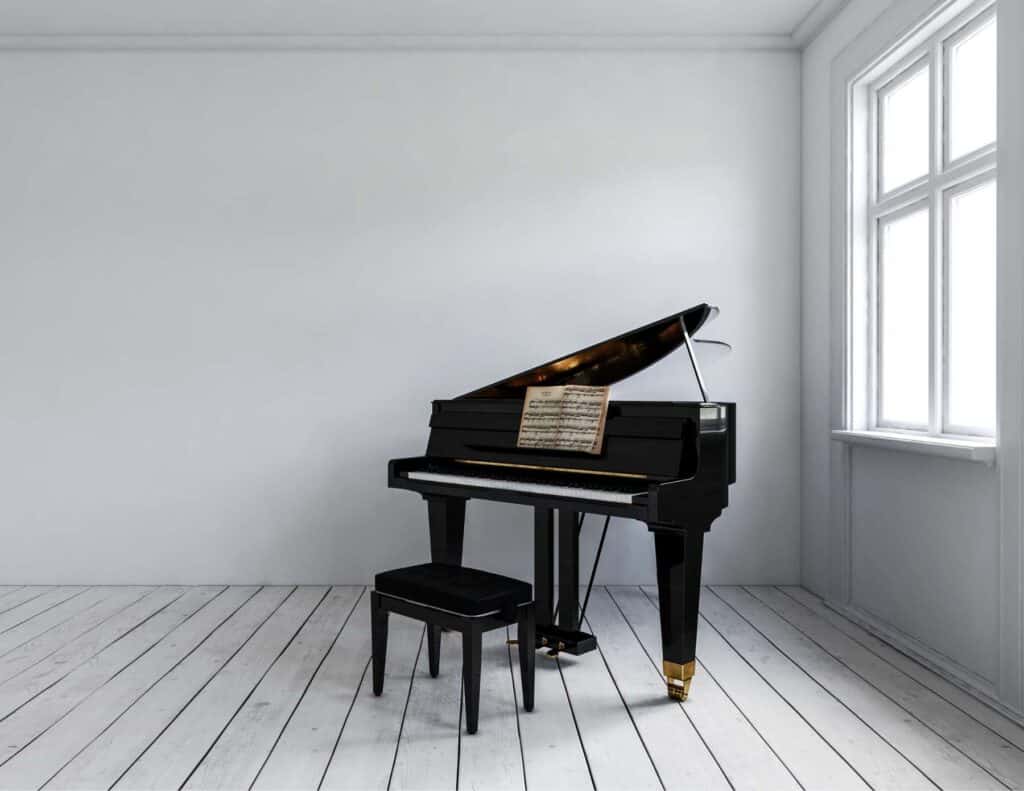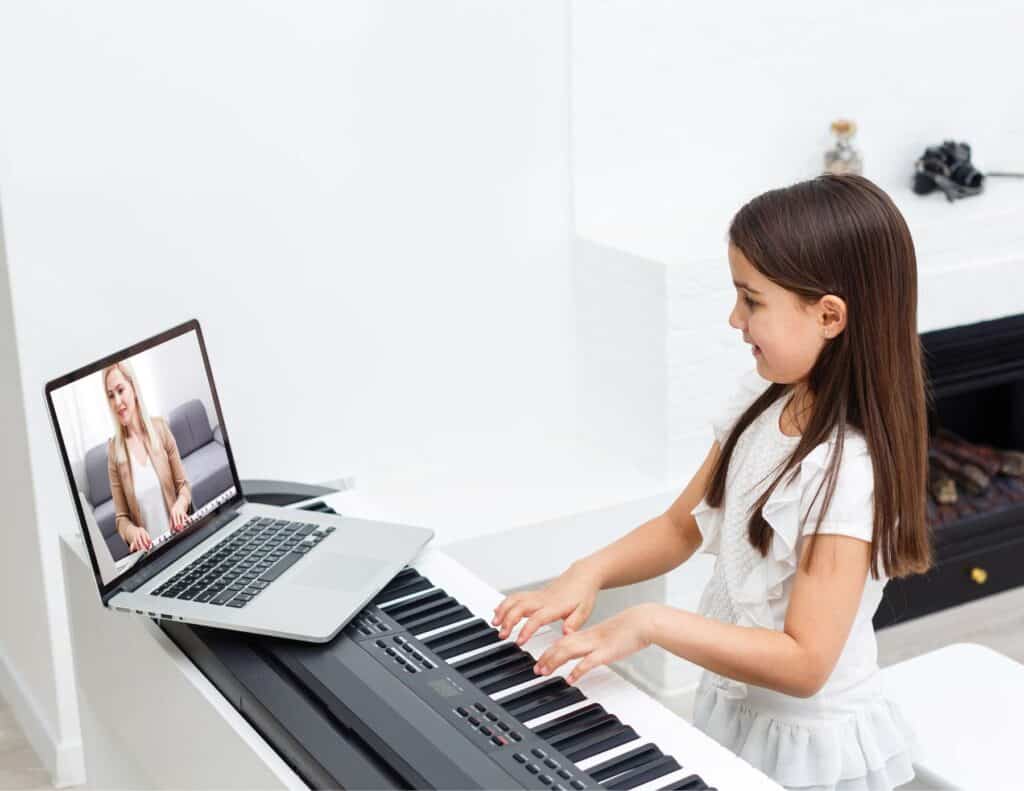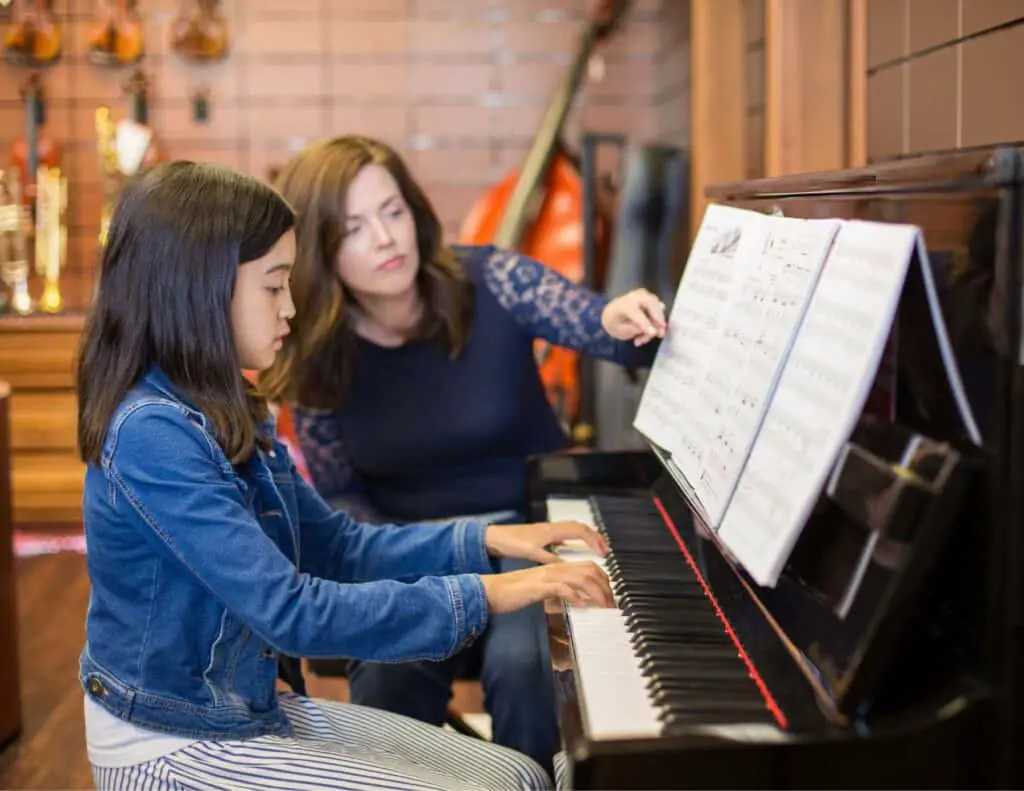Learning how to play the piano can be a challenging yet rewarding experience but almost equally as challenging is proper piano practice technique.
Practicing the proper way is the key to mastering this instrument since learning bad habits early can be detrimental to your future playing.
By following the tips and techniques provided by experienced piano players, you can improve your playing, expand your musical knowledge, and ultimately achieve your goals as a pianist.

Why is Piano Practice Important?
Whether you are a beginner or an advanced player, regular piano practice will help you improve your technique, build your repertoire, and develop your musicality. Here are some reasons why practicing the piano is important:
1. Develops Technique
Regular piano practice is important in refining your technique and ensuring steady progress. By dedicating time to practice, you can nurture essential aspects such as finger dexterity, hand position, and posture.
Consistent piano practice cultivates precision and control, allowing your fingers to effortlessly glide across the keys with increased agility and accuracy.
Practicing regularly serves also as a safeguard against developing detrimental habits. Early on in your piano journey, it is vital to establish correct techniques and avoid improper hand placement or posture that may hinder your progress in the long run.
2. Builds Repertoire
Building repertoire means expanding your collection of pieces that you can confidently perform, spanning across various genres, from classical masterpieces to contemporary compositions.
As you practice diligently, you’ll find yourself mastering a wider range of pieces, each contributing to your growing repertoire. This process not only enhances your versatility as a musician but also allows you to explore and appreciate the richness and diversity of different musical genres.
Whether it’s the timeless elegance of a Chopin Nocturne or the lively rhythms of a jazz standard, building your repertoire exposes you to new musical horizons and expands your artistic horizons.
An extensive repertoire provides you with the ability to adapt to different performance opportunities and musical contexts. From recitals to collaborations, having a varied selection of pieces at your fingertips allows you to curate captivating performances that captivate audiences and showcase your musical prowess.
3. Improves Musicality
As you dedicate time to honing your skills, you’ll witness a remarkable transformation in your ability to play with heightened expression, dynamics, and tempo.
This evolution is essential as it empowers you to go beyond simply playing the notes and delve into the realm of conveying deep emotion and meaning through your music.
Consistent piano practice nurtures your musicality by instilling a profound understanding of how to infuse each note with intention and purpose. You’ll learn to bring out the nuances and subtleties of a piece, allowing your playing to resonate with a captivating richness.
By exploring different dynamics, you can create contrasting moods, from gentle and introspective to bold and passionate. Additionally, your grasp of tempo will enable you to master the art of pacing, enhancing the narrative arc of a composition and captivating listeners with your interpretation.
Through your playing, you’ll be able to communicate and evoke a wide range of emotions, transporting both yourself and your audience on a captivating musical journey.
4. Enhances Concentration
Playing the piano demands your undivided attention, as you navigate intricate melodies, harmonies, and rhythms.
By committing to regular practice sessions, you strengthen your concentration muscles, allowing you to delve deep into the music, free from distractions. As you train your mind to maintain focus during practice, you develop the invaluable ability to block out external disturbances, sharpening your ability to concentrate for extended periods.
The concentration cultivated through piano practice transcends the realm of music, permeating into other aspects of your life. The discipline and focus honed at the keys translate into improved concentration in academic or professional pursuits. You’ll find yourself better equipped to tackle complex tasks, maintain attention during important meetings, and absorb information more effectively.
Enhanced concentration brings forth a sense of mindfulness and presence. The mental discipline fostered through piano practice allows you to fully engage in the present moment, fostering a deeper connection to the music and amplifying your performance.
5. Develops a Practice Routine
By committing to consistent piano practice, you’ll establish a structured schedule that not only keeps you motivated but also propels your progress on the instrument.
Cultivating a practice routine requires finding the ideal time and location that allow you to immerse yourself in focused practice, free from distractions.
Setting aside dedicated time for piano practice provides a sense of structure and purpose to your musical endeavors. By designating specific slots in your daily or weekly schedule, you create a rhythm of regularity that becomes ingrained in your routine. This consistency becomes a powerful tool, as your mind and body acclimate to the practice routine, making it easier to transition into a focused piano practice mindset.
Knowing that you have allocated time solely for practice encourages you to honor your commitment and approach the piano with dedication and enthusiasm. It becomes a regular appointment with your instrument, fostering a sense of discipline and progress.
Finding a conducive environment for piano practice is equally vital. Identify a space that minimizes distractions, allowing you to fully immerse yourself in the music. Whether it’s a dedicated music room or a quiet corner, the right setting enhances focus and concentration, enabling you to make the most of your practice time.
6. Builds Repetition
Embracing repetition is key to learning new pieces and refining your piano technique. With each deliberate repetition, you solidify neural connections, build muscle memory, and unlock the potential for true musical fluency.
By approaching each piece with patience and dedication, you lay a strong foundation for proficiency. Begin by practicing slowly, allowing your mind and fingers to synchronize with the music.
Gradually, as you become more comfortable with the piece, you can increase the tempo, unveiling the full potential of the composition.
Notes, chords, and progressions become ingrained in your muscle memory, enabling you to play with greater precision and ease. By repeating specific passages or challenging sections, you gain confidence and accuracy, transforming potential stumbling blocks into triumphs.
As you revisit passages, you uncover subtleties and nuances that may have eluded you initially. This enhanced awareness allows you to infuse the music with your unique interpretation, breathing life into the composition.
7. Improves Memory
As you dedicate yourself to consistent piano practice sessions, you’ll witness the remarkable benefits of enhanced memory, enabling you to memorize pieces effortlessly and play them from the depths of your mind.
This invaluable skill frees you from relying solely on sheet music, allowing you to immerse yourself in the musicality of the piece.
As you repeatedly engage with a piece, notes, rhythms, and patterns become deeply ingrained in your memory. Through the process of repetition, your brain forges strong neural connections, creating a solid foundation for memorization.
Having an improved memory liberates you from the constraints of reading sheet music, enabling you to fully engage with the music itself. With your eyes free from the page, you can focus on the emotional nuances, dynamics, and expressive elements, immersing yourself in the true essence of the composition.
It allows for a deeper connection with the music, fostering a more profound expression and interpretation. By internalizing the piece, you have the freedom to explore its depths, infusing it with your unique musical voice.
When you approach new music you will find that the combination of muscle memory and cognitive memory will improve your site reading skills. Your muscles and brain like patterns and the more music, scales, arpeggios, and etudes you play the more ingrained these patterns become in your fingers and mind.
Developing your memory through regular piano practice extends beyond the realm of music. The cognitive benefits spill over into other areas of your life, sharpening your memory skills and aiding in academic or professional pursuits.
8. Develops a Warm-Up Routine
By dedicating yourself to consistent piano practice sessions, you’ll develop a valuable habit of warming up your fingers and hands before delving into more complex pieces. This practice is critical as it helps prevent injuries and enables you to play for longer periods without fatigue.
A warm-up routine sets the stage for optimal performance at the piano. It prepares your muscles, tendons, and ligaments for the demands of playing, gradually easing them into action.
Gentle warm-up exercises, such as scales, arpeggios, or finger exercises, stimulate blood flow and promote flexibility, reducing the risk of strain or injury.
By incorporating a warm-up routine into your piano practice sessions, you enhance your technical capabilities right from the start. The deliberate movements and exercises prime your fingers, allowing for greater agility, precision, and control. This foundation of warm-up exercises ensures that you approach more complex pieces with readiness, enabling you to execute challenging passages with confidence and finesse.
By adequately preparing your muscles and joints, you can play for longer periods without experiencing undue fatigue. This extended stamina allows for more productive practice sessions and fulfilling performances.
Prioritizing a warm-up routine in your piano practice not only safeguards your physical well-being but also sets the stage for musical excellence. By incorporating warm-up exercises into your regular routine, you create a ritual of preparation and care, laying the groundwork for optimal performance and prolonged enjoyment at the keys.

Setting Up Your Piano Practice Space
When it comes to practicing the piano, having a dedicated space can make a world of difference. Here are some tips on setting up your practice space for optimal productivity and comfort.
- Location: Consider the location of your practice space. It should be a quiet area where you can focus without distractions. Ideally, it should also be well-lit and have good ventilation. If possible, choose a space with a door that can be closed to minimize interruptions.
- Piano or Keyboard: If you have a piano, it’s important to make sure it’s properly tuned and maintained. If you’re using a keyboard, make sure it’s set up at the right height and angle for comfortable playing. Consider investing in a keyboard stand or piano bench to help with ergonomics.
- Equipment and Accessories: Make sure you have all the necessary equipment and accessories for your piano practice sessions. This might include a music stand, metronome, headphones, and any sheet music or practice materials you need. Keep your equipment organized and easily accessible.
- Electricity: If you’re using a digital piano or keyboard, make sure your practice space is well-connected to electricity. Consider investing in a power strip or two if you need additional outlets for your equipment.
- Connectivity: If you frequently participate in online lessons or use online practice aids, make sure your space has easy access to the internet via strong wifi or an ethernet cable.
Creating a Piano Practice Routine
Creating a practice routine is essential to improving piano skills. Without a routine, it can be challenging to stay motivated and focused. A good piano practice routine can help establish good habits, build discipline, and ensure that the necessary skills are being developed. Here are some tips for creating a practice routine:
Determine the Time and Frequency
The first step in creating a piano practice routine is to determine how much time is available and how often practice can be done. It’s better to have shorter, more frequent practice sessions than long, infrequent ones.
Pro Tip: Practicing for 30 minutes every day is more effective than practicing for two hours once a week.
Incorporate Repetition
Repetition is very important in mastering piano skills. It’s essential to practice a skill or piece of music until it becomes second nature. Incorporating repetition into a piano practice routine can help build muscle memory and improve accuracy.
Mix it Up
It’s important to keep your piano practice sessions interesting and varied. Mixing up the routine can help prevent boredom and burnout. Some ways to mix it up include practicing different genres of music, playing with a metronome, or practicing scales and arpeggios in different keys.
Set Realistic Goals
Setting realistic goals is essential to building a successful practice routine. Goals should be specific, measurable, and achievable.
Pro Tip: A goal could be to learn a new piece of music each week or to master a particular skill within a month.
Track Progress
Tracking progress is essential to staying motivated and seeing improvement. Keeping a piano practice journal to track progress can help identify areas that need improvement and celebrate accomplishments.
Warming Up
Warming up is an essential part of any piano practice routine. It helps prevent injury and prepares the fingers for playing. Here are some tips for warming up before playing the piano:
- Stretching: Before playing, it’s important to stretch the fingers, hands, and arms to prevent injury. Simple stretches like making a fist and then opening the hand can help loosen up the muscles.
- Scales: Playing scales is an excellent way to warm up the fingers and improve technique. Start with a slow tempo and gradually increase the speed. Playing scales in different keys can help improve finger dexterity.
- Arpeggios: Arpeggios are another great way to warm up the fingers and improve technique. Start with a slow tempo and gradually increase the speed. Playing arpeggios in different keys can help improve finger strength.
- Hanon and Czerny Exercises: These exercises are designed to improve finger strength, dexterity, and technique. They can be challenging, but they are an excellent way to warm up before playing.
- Playing a Piece Slowly: Playing a piece slowly can help warm up the fingers and improve technique. Start with a slow tempo and gradually increase the speed.
Remember to take breaks and rest your fingers if they start to feel tired or sore. Warming up is an important part of piano practice and can help improve technique and prevent injury.
Using a Metronome
A metronome is an essential tool for any pianist who wants to improve their rhythm and timing. It is a device that produces a steady beat at a set tempo, allowing the pianist to practice playing in time and at a consistent speed. Here are some tips on how to use a metronome effectively:
- Selecting the Right Tempo: The first step in using a metronome is to select the right tempo. It’s important to start with a slow tempo and gradually increase the speed as you become more comfortable with the piece. The metronome can help you maintain a consistent tempo throughout the piece, which is especially important when playing with other musicians.
- Internalizing the Beat: It’s important to internalize the beat of the metronome before you start playing. This means tapping your foot or counting out loud with the metronome until you feel comfortable with the tempo. Once you’ve internalized the beat, you can start playing along with the metronome.
- Playing with the Metronome: When playing with the metronome, it’s important to stay in time with the beat. This means playing each note or chord exactly on the beat, without rushing or dragging. If you find that you’re consistently playing ahead of or behind the beat, you may need to adjust your tempo or practice playing with the metronome at a slower speed.
- Varying the Tempo: While it’s important to maintain a consistent tempo when practicing with a metronome, it’s also important to vary the tempo to improve your timing and rhythm. This can be done by gradually increasing or decreasing the tempo, or by playing with the metronome at different tempos throughout the piece.

Online Resources
For those who prefer to practice piano in the comfort of their own home, there are a variety of online resources available to help improve their skills. Here are a few options to consider:
Virtual Piano
Virtual pianos are a great option for those who don’t have access to a physical piano or keyboard.
Recursive Arts Virtual Piano simulator is a popular choice that allows users to play notes using their computer keyboard or mouse. It also features a world-class Grand Piano sound and is available on both desktop/laptop computers and mobile devices.
Online Piano Tutoring
Another option for practicing piano online is using an online piano keyboard.
Flowkey is a popular online piano learning app that allows users to learn their favorite songs on piano, no matter their level.
Pianu is another interactive online piano that teaches users how to play on their own device. It offers a variety of features including a song library, equipment accessories, and game applications.
Sheet Music
Sheet music is an essential resource for piano players of all levels. There are a variety of websites and apps that offer free sheet music, including 8notes and MuseScore.
For those who prefer to purchase sheet music, Musicnotes is a popular option that offers digital sheet music for a variety of instruments, including piano.
Mobile Devices and Tablets
For those who prefer piano practice on the go, there are a variety of mobile apps available for both iOS and Android devices.
Simply Piano is a popular app that offers piano lessons and allows users to practice using their mobile device or tablet.
Piano Maestro is another option that offers a variety of features including sheet music, lessons, and games.

Finding a Teacher
One of the most important steps in learning to play the piano is finding a good teacher. A good teacher can help you develop your skills and guide you through the learning process. Here are some tips for finding a teacher:
- Ask for Recommendations: Ask friends, family, or colleagues who play the piano if they can recommend a good teacher. This can be a great way to find a teacher who has a good reputation and who has helped others in the past.
- Check Online Directories: Online directories, such as TakeLessons or MusicTeacher.com, can be a useful resource for finding a piano teacher in your area. These directories allow you to search for teachers based on location, availability, and other criteria.
- Attend Recitals or Concerts: Attending recitals or concerts can be a great way to meet teachers and see them in action. This can give you a better sense of their teaching style and whether they might be a good fit for you.
- Consider the Teacher’s Qualifications: When looking for a piano teacher, it’s important to consider their qualifications. Look for a teacher who has a degree in music or who has experience teaching piano. You may also want to consider their teaching philosophy and whether it aligns with your own goals and learning style.
- Ask About Their Teaching Approach: Different teachers may have different approaches to teaching the piano. Some may focus on classical music, while others may emphasize improvisation or pop music. Make sure to ask potential teachers about their approach and whether it aligns with what you’re looking for.
- Consider Cost and Availability: Piano lessons can be expensive, so it’s important to consider the cost when looking for a teacher. You may also want to consider their availability and whether they can work with your schedule. Some teachers may offer discounts for booking multiple lessons in advance.
Frequently Asked Questions
How Can I Improve My Piano Practice Sessions?
Improving piano practice sessions can be achieved by setting clear goals and structuring practice time effectively. It is also important to practice regularly, even if it is just for a short time each day.
What Are Some Effective Ways to Practice Piano Scales?
One effective way to practice piano scales is to start slowly and focus on accuracy. Gradually increase the speed as accuracy improves. Another effective method is to practice scales in different keys and with different rhythms.
What Are Some Good Piano Exercises for Beginners?
Good piano exercises for beginners include practicing finger independence, hand position, and basic music theory concepts such as note reading and rhythm.
How Much Time Should I Spend Practicing Piano Each Day?
The amount of time spent practicing piano each day depends on the individual’s goals and schedule. It is recommended to practice for at least 30 minutes a day, but longer sessions are beneficial for more advanced players.
What Are Some Tips for Practicing Piano for Beginners?
Tips for practicing piano for beginners include starting with simple pieces, breaking down difficult sections into smaller parts, and practicing consistently.
How Can I Stay Motivated to Practice Piano Regularly?
Staying motivated to practice piano regularly can be achieved by setting achievable goals, practicing with a friend or teacher, and finding pieces that are enjoyable to play. It is also important to remember that progress takes time and to celebrate small victories along the way.
